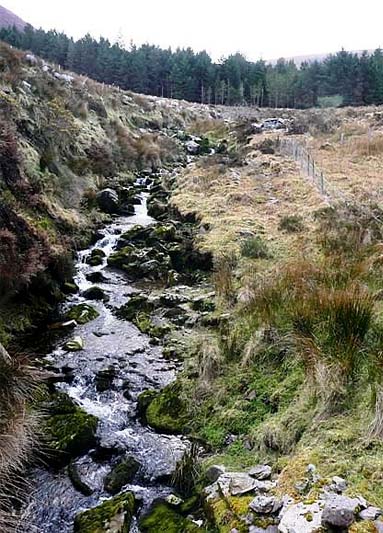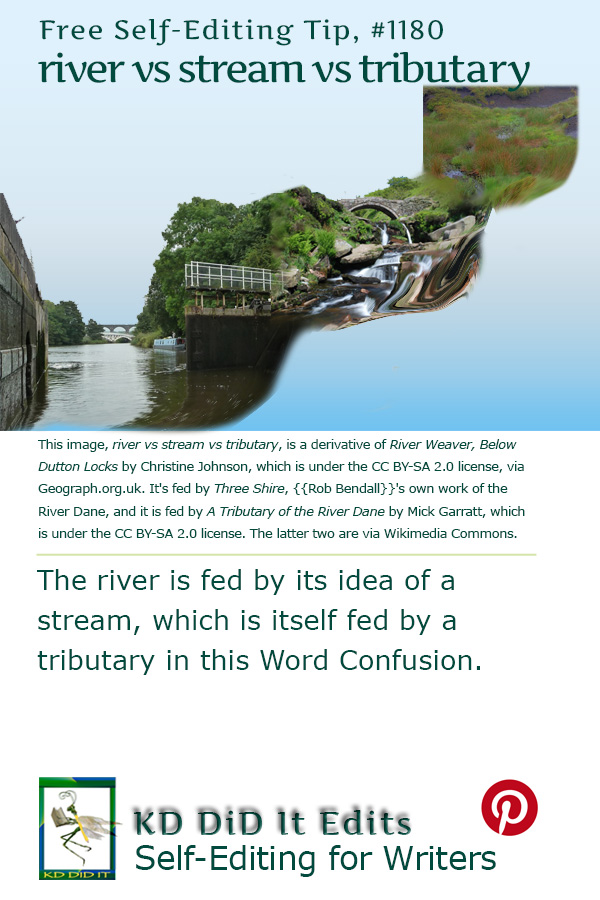I’m continuing my obsession with bodies of water and this word confusion explores river, stream, and tributary.
Which means that I’ll only be covering the noun aspect of stream and ignoring its role as an intransitive and transitive verb. Nor will I be exploring the adjectival definition of tributary.
I must confess I hadn’t known that a stream is merely a small river.
Tributary is somewhat more complex in that it’s a smaller flow of water that flows to a larger stream or other body of water. All a tributary needs to do is be smaller than what it’s flowing into.
Exploring Later . . .
You may want to explore “Anchorage, Haven, Moorage, and Roadstead“, “Arroyo vs Coulee vs Wadi vs Wash“, “Bay vs Bight vs Cove“, “Bayou vs Bog vs Marsh vs Swamp“, “Beach vs Coast vs Shore“, “Born vs Borne vs Bourn“, “Brook vs Burn vs Draw vs Lick“, “Canal vs Impoundment vs Moat vs Reservoir“, “Cay vs Key vs Quay“, “Channel vs Dyke vs Rill“, “Creak versus Creek“, “Dam versus Damn“, “Delta vs Estuary vs Rapids vs Source“, “Dock vs Pier vs Wharf“, “Firth vs Fjord vs Gulf“, “Harbor vs Marina vs Port vs Quay“, “Lakes: Kettle, Loch, Mere, and Oxbow“, “Ocean versus Sea“, “Peer versus Pier“, “Rivulet vs Runnel vs Sike“, “Sea versus See“, “Slew versus Slough“, and “Straight versus Strait“.
Word Confusions . . .
. . . started as my way of dealing with a professional frustration with properly spelled words that were out of context in manuscripts I was editing as well as books I was reviewing. It evolved into a sharing of information with y’all. I’m hoping you’ll share with us words that have been a bête noire for you from either end.
If you found this post on “River vs Stream vs Tributary” interesting, consider subscribing to KD Did It, if you’d like to track this post for future updates.
| River | Stream | Tributary |
|---|---|---|

Ohio River, north of Powhatan Point in Ohio, USA, by James St. John is under the CC BY 2.0 license, via Flickr. |

Forested Stream, Hardy County, West Virginia, is courtesy of the Chesapeake Bay Program and is under the CC BY-NC 2.0 license, via Flickr. |

Gleensk River Tributary, near to Kells in County Kerry, Ireland, by Graham Horn is under the CC BY-SA 2.0 license, via Georgraph.ie. |
| Part of Grammar: | ||
| Noun
Plural: rivers |
Noun
Plural: streams |
Noun 1, 2
Plural: tributaries |
A large, natural, continuous passage of water flowing in a channel to the sea, a lake, or another such watercourse
|
A small, narrow continuous passage of water
A continuous flow of liquid, air, or gas
[Computing] A continuous flow of data or instructions, typically one having a constant or predictable rate.
[British] A group in which schoolchildren of the same age and ability are taught
|
A river or stream flowing into a larger river or lake 1
[Historical] A person or state that pays tribute to another state or ruler 2 |
| Examples: | ||
| The second-longest river in Europe, after the Volga in Russia, the Danube River flows through much of Central and Southeastern Europe, from the Black Forest into the Black Sea.
For a considerable distance, the Mekong River constitutes the boundary between Laos and Thailand. River pollution is considered worst in the Salween. Large rivers of lava flow in natural channels of their own creation. The trickle of disclosures has grown into a river of revelations. River dolphins act as indicators of river health in the basins where they live. The river birch naturally grows along riverbanks, but is rapidly becoming popular as a landscape tree. |
It was the perfect trout stream.
Frank blew out a stream of smoke. The blood gushed out in scarlet streams. There is a steady stream of visitors. We were inundated with a constant stream of enquiries. A woman screamed a stream of abuse. This new service has created a new stream of revenue for the company. A virus has interrupted the data stream. Most of us watch video in streams downloaded from the Internet. These children are in the top streams. We all have to go along with the stream, not fight against one another. |
The Illinois River is a tributary of the Mississippi.
“That figure suggests how much rain may have fallen elsewhere over the 11,560 square miles of field and forest and city and town that drain into the tributaries that empty into the Potomac before it arrives at Little Falls” (Weil). “A four-acre sinkhole there had opened at the plant’s coal ash pond years earlier, releasing over 2 million gallons of arsenic-laced ash and water into a tributary of the Etowah River” (Blau). “Many neighboring East, Central, and Southeast Asian countries and regions [became] tributary states of various Chinese dynasties” (Tributary). The tributaries of the Ottoman Empire are expected within three days. |
| Derivatives: | ||
| Adjective: rivered, riverless | Adjective: streamable, streaming, streamline, streamlined, streamlining Noun: streamer, streamflow, streaming, streamlet, streamline, streamlining Verb: streamline, streamlining |
Adjective: nontributary, untributary Adverb: tributarily, untributarily Noun: tributariness, tribute |
| History of the Word: | ||
| Middle English from the Anglo-Norman French, based on the Latin riparius, from ripa meaning bank of a river. | Old English strēam (noun) is of Germanic origin and related to the Dutch stroom, the German Strom, from an Indo-European root shared by the Greek rhein meaning to flow. |
|
C’mon, get it out of your system, bitch, whine, moan . . . which words are your pet peeves? Also, please note that I try to be as accurate as I can, but mistakes happen or I miss something. Email me if you find errors, so I can fix them . . . and we’ll all benefit!
Satisfy your curiosity about other Word Confusions on its homepage or more generally explore the index of self-editing posts. You may also want to explore Book Layout & Formatting Ideas, Formatting Tips, Grammar Explanations, Linguistics, Publishing Tips, the Properly Punctuated, Writing Ideas and Resources, and Working Your Website.
Resources for River vs Stream vs Tributary
Some of these links may be affiliate links, and I will earn a small percentage, if you should buy it. It does not affect the price you pay.
Apple Dictionary.com
Blau, Max. “A Power Company’s Quiet Land-buying Spree Could Shield It From Coal Ash Cleanup Costs.” Georgia Health News. ProPublica. 24 Nov 2020. Web. 28 Nov 2023.
Dictionary.com: tributary
“Tributary State.” Wikipedia. 24 Mar 2023. Web. 28 May 2023. <https://en.wikipedia.org/wiki/Tributary_state>.
Weil, Martin. “Our Second-coldest Day of 2020 Came on Saturday.” Washington Post. 27 Dec 2020. Web. 28 May 2023. <https://www.washingtonpost.com/local/our-second-coldest-day-of-2020-came-on-saturday/2020/12/26/ebd74a5c-47d4-11eb-975c-d17b8815a66d_story.html>.
Pinterest Photo Credits
River Weaver, Below Dutton Locks by Christine Johnson is under the CC BY-SA 2.0 license, via Geograph.org.uk. It’s fed by Three Shire, {{Rob Bendall}}’s own work of the River Dane, and it is fed by A Tributary of the River Dane by Mick Garratt, which is under the CC BY-SA 2.0 license. The latter two are via Wikimedia Commons. The three images were merged in Photoshop and then a liquify filter was applied along the bottom edge of the merged layer.
Revised as of 17 Apr 2024
By: Kathy Davie

